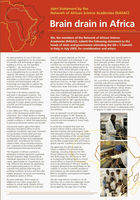“One-third of all African scientists live and work in developed countries. This outflow represents a significant loss of economic potential for the continent, especially in today’s global society where scientific and technological knowledge drive development.”
The critical issue of brain drain – the loss of Africa’s scientific workers to richer countries, largely in the developed world – is the focal point of concern in a statement issued by the Network of African Science Academies (NASAC), a group of 13 merit-based science academies in Africa. The statement will be formally presented to the heads of states attending the G8+5 Summit in L’Aquila, Italy, in July.
While the statement acknowledges that responsibility for addressing Africa’s brain drain rests primarily with the governments of Africa, it also asserts that external help is critical for the vast majority of African countries that do not have sufficient resources to invest in institutions of higher education and research.
Consequently, NASAC urges the G8+5 countries to invest in the rebuilding of universities and research centers in Africa and to support young African scientists seeking postgraduate and postdoctoral training. It also calls on G8+5 countries to fund the building of regional and international centers of excellence in Africa, especially in areas of study of critical importance to Africa’s development, and to encourage Africa’s Diaspora – African-born scientists living abroad – to participate in joint projects with scientists in Africa. And it reminds G8+5 countries that they have yet to honor the pledge they made at the G8+5 Summit in 2005 to provide US$5 billion to help rebuild universities and US$3 billion to help establish centers of scientific excellence in Africa.
The statement concludes by urging “the G8+5 countries to embrace science and technology as a collaborative enterprise where national borders count but nevertheless remain open, and where science and technology ultimately serve as bridges, not barriers, to social and economic progress.”
Editor's note:
NASAC is a regional network of science academies in Africa dedicated to helping its member become more effective advocates for science and science-based development in Africa. Its members include: the African Academy of Sciences; Cameroon Academy of Sciences; Ghana Academy of Arts and Sciences; Kenya National Academy of Sciences; Madagascar National Academy of Arts, Letters, and Sciences; Nigerian Academy of Science; Academie des Sciences et Techniques du Senegal; Academy of Science of South Africa; Sudan National Academy of Sciences; Tanzania Academy of Sciences; Uganda National Academy of Sciences; Zambia Academy of Sciences; Zimbabwe Academy of Sciences. For additional information about NASAC, see www.aasciences.org/index.php?option=com_content&view=article&id=64&Itemid=60
Contacts:
Jackie Olang – j.olang@afornet.org, j.olang@aasciences.org / + 254 720 566 605 (Nairobi, Kenya)
Daniel Schaffer – schaffer@twas.org / +39 040 2240 538 (Trieste, Italy)


